Review of Operations – UK and Europe
Tata Steel UK commenced full-fledged operations in its current form in April 2007. In keeping with the global vision of the Group, and focus in UK and Europe, the operational strategy of Tata Steel UK is based on delivering a steady return on assets through the steel cycle, within a safe and sustainable environment. Aligned to this, the Company has developed specific and measurable objectives. These include:
- to selectively grow downstream value through supporting attractive market segments and by being the best supplier to customers.
- to develop more value added and specialist products, services and systems.
- to develop a competitive cost base across the production sites.
- to develop robust sources of competitive advantage through sharing of manufacturing and technical excellence, commercial coordination and supply chain optimisation.
The IJmuiden Steelworks remains Corus’ largest and most cost efficient steel making facility. It has a production capacity of 7.4 mtpa, and its installed capacity is in the process of being expanded to 7.5 mtpa by 2010.
2007-08 was a mixed year for the Strip Products Division in terms of operations. Marked by higher outputs and improved manufacturing efficiencies, overall operational performance remained strong with new records achieved in iron and liquid steel production at the two integrated steelmaking sites at IJmuiden and Port Talbot, with Port Talbot reaching a consistent 3 mtpa target for Hot Mill output.
The Long Products Division saw significant change through 2007-08. Corus Engineering Steels operations showed improved stability as manufacturing and volume benefits from the restructuring investment continued to flow through, although there was an adverse effect from widespread flooding during the year. The Medium Section Mill at the Scunthorpe plant of Corus Construction and Industrial commissioned long rail rolling slower than expected, with a consequential effect on deliveries into the UK market.
Within the Distribution and Building Systems Division, 2007-08 saw strong demand for the Distribution businesses’ products being sold from steel service centres in the UK, Netherlands and Germany. Gross margins were favourably impacted across Europe by the inherent profit on stock originally being held at low input cost levels, ahead of price increases.
Enhancing efficiencies and capacities
At IJmuiden, a new continuous galvanising line and new 3-stand cold rolling mill is
being installed to increase the production capacity of automotive market products
that will also be able to produce specialty high strength steel grades. The cold rolling
mill enhancement will provide additional cold rolling capacity in support of the new
galvanising line.
At Scunthorpe, Corus is developing a medium section mill, rod mill and bloom casting, in order to enable the rolling of transport rail and other rail sections, as well as enhancing other section rolling capabilities.
The Port Talbot BOS gas recovery and energy management investment will significantly reduce natural gas and electricity purchases, and materially reduce carbon dioxide emissions at the site, through the utilisation of gas generated inside the Basic Oxygen Steel plant.
The slab caster enhancement project at Teesside involves installing hydraulic width control and making structural modifications and improvements to water-cooling systems. As the project is undertaken pursuant to an offtake agreement entered into in January 2005 with a consortium of external slab purchasers, almost 76% of the total investment costs will be funded by the external consortium of re-rollers.
Technology
The Group places considerable emphasis on research and
development, and on continuous improvement of processes
and products.
Process developments
Process Improvement Groups were established as part of the
Corus Restoring Success programme and their efforts helped to
meet the objectives of The Corus Way. This work has continued to
give rise to projects aimed at applying best practices and transfer
of relevant knowledge throughout the Group, now also including
Tata Steel Group. The Group is a major partner in the ULCOS (Ultra
Low CO2 Steelmaking) project, aimed at developing technology to achieve a 50%
reduction of CO2 emissions per tonne of steel produced by 2050.
Product developments
The main focus for strip products continued to be the further development and
improvement of steel grades with high strength and good formability. The Group
is jointly developing with POSCO, a novel coating process, which if successful,
will enable novel metal-based coatings to be produced with properties tailored
to the needs of different markets.
Application developments
The Group is leading the Framework6 project ManuBuild aimed at developing
advanced industrial construction techniques for residential, education and
healthcare buildings.
A successful full scale plant trial with High Efficiency Combustion burners in one of the reheating furnaces at Llanwern has proven that applying this technology leads to significant energy savings as well as substantial reduction of CO2 and oxides of nitrogen emissions. Based on these results, it is planned to apply this technology to reheating furnaces in IJmuiden.


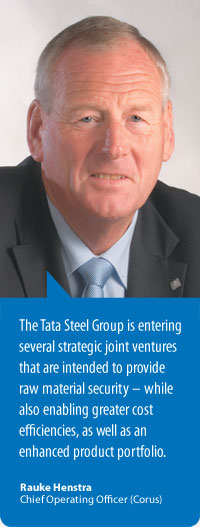 Tata Steel UK commenced full-fledged operations in its current form in April
2007. In keeping with the global vision of the Group, and focus in UK and Europe,
the operational strategy of Tata Steel UK is based on delivering a steady return
on assets through the steel cycle, within a safe and sustainable environment.
Aligned to this, the Company has developed specific and measurable objectives.
These include:
Tata Steel UK commenced full-fledged operations in its current form in April
2007. In keeping with the global vision of the Group, and focus in UK and Europe,
the operational strategy of Tata Steel UK is based on delivering a steady return
on assets through the steel cycle, within a safe and sustainable environment.
Aligned to this, the Company has developed specific and measurable objectives.
These include: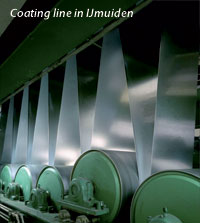 Within the Distribution and Building Systems Division, 2007-08 saw strong
demand for the Distribution businesses’ products being sold from steel service
centres in the UK, Netherlands and Germany. Gross margins were favourably
impacted across Europe by the inherent profit on stock originally being held at
low input cost levels, ahead of price increases.
Within the Distribution and Building Systems Division, 2007-08 saw strong
demand for the Distribution businesses’ products being sold from steel service
centres in the UK, Netherlands and Germany. Gross margins were favourably
impacted across Europe by the inherent profit on stock originally being held at
low input cost levels, ahead of price increases.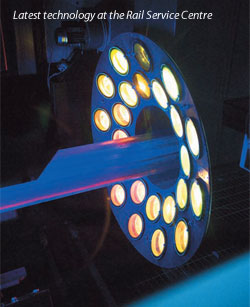 The Port Talbot BOS gas recovery and energy management
investment will significantly reduce natural gas and electricity
purchases, and materially reduce carbon dioxide emissions at
the site, through the utilisation of gas generated inside the Basic
Oxygen Steel plant.
The Port Talbot BOS gas recovery and energy management
investment will significantly reduce natural gas and electricity
purchases, and materially reduce carbon dioxide emissions at
the site, through the utilisation of gas generated inside the Basic
Oxygen Steel plant.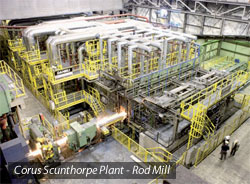 Process Improvement Groups were established as part of the
Corus Restoring Success programme and their efforts helped to
meet the objectives of The Corus Way. This work has continued to
give rise to projects aimed at applying best practices and transfer
of relevant knowledge throughout the Group, now also including
Tata Steel Group. The Group is a major partner in the ULCOS (Ultra
Low CO2 Steelmaking) project, aimed at developing technology to achieve a 50%
reduction of CO2 emissions per tonne of steel produced by 2050.
Process Improvement Groups were established as part of the
Corus Restoring Success programme and their efforts helped to
meet the objectives of The Corus Way. This work has continued to
give rise to projects aimed at applying best practices and transfer
of relevant knowledge throughout the Group, now also including
Tata Steel Group. The Group is a major partner in the ULCOS (Ultra
Low CO2 Steelmaking) project, aimed at developing technology to achieve a 50%
reduction of CO2 emissions per tonne of steel produced by 2050.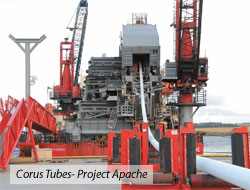 The Group is leading the Framework6 project ManuBuild aimed at developing
advanced industrial construction techniques for residential, education and
healthcare buildings.
The Group is leading the Framework6 project ManuBuild aimed at developing
advanced industrial construction techniques for residential, education and
healthcare buildings.